Stay in the know on all smart updates of your favorite topics.
Are you interested in the experiences of others working in smart city projects and organizations? The Smart City Academy provides available knowledge about smart city projects and can help you with project development. This Smart City Academy page provides you with information and researches about the impact and conditions of smart city projects. Professors, teachers and students study the initiation, management, collaboration and scaling of smart city projects and would like to share these results with you. They do so by organizing events and masterclasses, by developing smart city tools and methodologies and by making research and outcomes accessible. You can find everything here. And the good news is.... You can add your knowledge too! Are you working on Smart City research? Please feel free to share your knowledge in the Academy section, under ‘Other research and theses’. The Smart City Academy is powered by the Amsterdam University of Applied Sciences. If you have any questions, you can contact smartcityacademy@hva.nl
Metropolitan Mobility Podcast met Maurits van Hövell: van walkietalkies naar het Operationeel Mobiliteitscentrum

“Voorheen werd er gewoon rondgebeld: ‘Wij zitten in de instroom van de ArenA. We hebben nu 20.000 man binnen. Hoe gaat het bij jullie op straat?’” In de achtste aflevering van de serie A Radical Redesign for Amsterdam, spreken Carin ten Hage en Geert Kloppenburg met Maurits van Hövell (Johan Cruijff ArenA). Hoe houdt je een wijk met de drie grootste evenementenlocaties van het land, bereikbaar en veilig? Ze spreken elkaar in het Operationeel Mobiliteitscentrum over de rol van de stad Amsterdam, data delen en het houden van regie. A Radical Redesign for Amsterdam wordt gemaakt in opdracht van de Gemeente Amsterdam.
Luister de podcast hier: http://bit.ly/mvhovell
Meet Meli - A brand new smart city app to navigate congestion, over-tourism and place making.

Meet Meli - A simple app to tackle complicated smart city challenges like congestion, over-tourism and place making. Just point your smart phone in any inner-city location and the Meli app will reveal the story of the many monuments, artifacts or projects around you.
Meli is one of the teams in the AMS Startup Booster Program that focuses on early-stage startups that want to make a business out of solving metropolitan challenges. As one of the Booster mentors, I’ve had the great pleasure to work with Co-Founders Mehdi Brun & Lila Sour to further explore how they could use open-source city data to populate the app for a local Amsterdam case.
Since the Booster program is centrally located on the Marineterrein, we used community driven open data formats to help describe the many projects and experiments going on at Amsterdam’s Inner-city test ground for a sustainable living environment. Watch the project demo here: https://youtu.be/IChZ0OYB1Zg
Meli is one of 7 talented teams who will be pitch their solution at the upcoming Demo Day AMS Startup Booster 01 March @16-18h “Let them show you the endless possibilities for Amsterdam and cities worldwide" Register to attend Today!
The Meli mobile app is available on Android and iOS in 10 languages.
Smart Health Amsterdam is looking for an intern Communication & Events
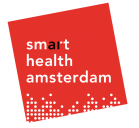
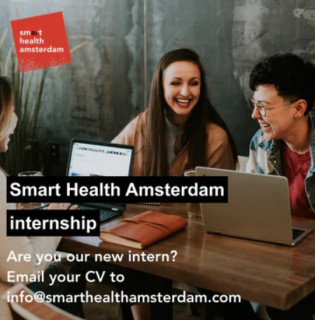
Looking for an internship where you can develop new skills in communications, marketing, PR and event management? Do you have an interest in how AI & data science can contribute to a healthier society and better medical care? Want to work as part of a fun and inspiring team?
As Amsterdam’s key network for data- and AI-driven innovation Smart Health Amsterdam (Gemeente Amsterdam & Amsterdam Economic Board) in #the #life #sciences and #health sector, we’re looking for an intern. Interested? Get in touch today.
https://smarthealthamsterdam.com/p/jobs-at--smart--health--amsterdam Smart
Amsterdam: circulaire stad in 2050

Amsterdam: circulaire stad in 2050
Ondanks de coronacrisis zijn tal van bedrijven in regio Amsterdam bezig met circulaire projecten, business cases en onderzoeken. Net als de gemeente Amsterdam streven zij naar een circulaire stad in 2050.
Benieuwd? Bekijk de video Amsterdam: circulaire stad in 2050. Voor meer informatie kun je ook kijken op de CACR pagina of op amsterdam.nl/circulair.
Accelerating circularity: monitoring tool geoFluxus helps cities turn company waste into value

Amsterdam 100% circular by 2050
The City of Amsterdam wants to be fully circular by 2050. That means that everything we use on a daily basis – from coffee cups to building materials – must consist of materials that have already had a previous life.
When it comes to household waste – this consists of, among others, vegetable, fruit and garden waste, paper, glass and textiles – the City has a duty to collect and process this. To give you an impression, the total household waste came down to about 380kg per year per person.
When comparing the amount of household versus company waste produced in the Amsterdam Metropolitan Area (AMA), still only 11% is household related, whereas 89% is company waste – such as sludge, scrap metals, wood and scrap lumber and very dedicated to the company processes related waste flows.
These company waste materials, as compared to consumer waste flows, often enter the waste flow in relatively good condition. This holds for instance for glass and wood, which are suitable for making window frames. If managed differently, these used materials in company 'waste' flows could be directly integrated at the start of the design process of new products.
So… How to boost the efficient re-use of company waste materials within the AMA?
geoFluxus: Turning data into comprehensible maps and graphs
With geoFluxus, incomprehensible waste data tables – including a.o. import and export and treatment methods – are converted into comprehensible maps and graphs. This is extremely valuable for spatial strategies in many other cities world-wide, and therefore TU Delft researchers Rusne Sileryte and Arnout Sabbe have founded the like-named spin off company geoFluxus, which has recently gone through a Arcadis City of 2030 Accelerator powered by Techstars.
Next to mapping waste, the geoFluxus team has connected open EU data on GHG emissions to the mapped waste flows by using transport, economic sector and waste treatment statistics. The resulting tool can provide governments with data evidence on what economic sectors, materials and locations hold the highest potential not only for waste reduction but also reductions of carbon emissions. Governments can use the tool to monitor progress towards circularity.
One company’s waste could be another one’s gain
The insights on the waste data generated by geoFluxus enable users to develop and test the impact of spatial strategies, for very specific locations, before actually implementing them. In addition, geoFluxus takes on a “match making” role: to have companies select company materials from other actors close by to re-use these instead of transporting the materials for waste treatment outside the AMA... Click on the link to read the full article >>
Inkopen met Impact - hoe start je daarmee?

Met elke euro die je als organisatie uitgeeft aan producten en diensten, heb je de keuze voor het duurzamer, eerlijker of innovatiever alternatief. Denk aan circulaire en energiebesparende producten en diensten, maar ook aan verantwoorde inzet van technologie. Daarmee is inkopen een belangrijke driver voor een slimme, groene en gezonde toekomst. Budgetten worden anders ingezet en systemen en gewoontes worden zo doorbroken.
De Amsterdam Economic Board heeft inmiddels een heel Insights dossier gericht op Inkopen met Impact. Daarin vind je achtergrondartikelen, maar ook quickstarts die je op weg helpen bij het verantwoorder inkopen van bijvoorbeeld bedrijfscatering, werkkleding of bouw en onderhoud van je organisatie. Je vindt al deze quickstarts in het dossier Inkopen met Impact. Je vindt er ook links naar hoe je je kunt aansluiten bij activiteiten van de Board die je helpen met beter inkopen.
Podcast31 ‘inkopen met impact’ van Platform 31
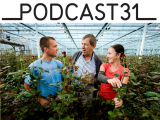
Als publieke organisatie kun je verschil maken met hoe en waar je diensten of producten inkoopt. Zo kun je bijvoorbeeld bijdragen aan een slimme, groene en gezonde toekomst door te kiezen voor duurzame producten of circulaire materialen. Of kiezen voor bepaalde dienstverleners die ook bijdragen aan een inclusieve samenleving. Inkoopkeuzes hebben dus maatschappelijk impact. Hoe kun je daarop sturen? En wat zijn de mogelijkheden als publieke organisatie? Daarover gaat de nieuwste aflevering van Podcast31.
Sommigen noemen het inkopen met maatschappelijke impact, anderen noemen het duurzaam of sociaal inkopen. Je kunt opdrachten opknippen in percelen opknippen en uitbesteden aan sociale ondernemers. Of gunningscriteria opnemen als inkoopvoorwaarde, zodat impact als randvoorwaarde geldt. Wat is daarin het verschil? En welke mogelijkheden heb je als bijvoorbeeld gemeente wanneer je met jouw manier van inkopen rekening wilt houden met de maatschappelijke impact?
Om antwoord te krijgen op deze (en meer) vragen, praat gespreksleider Fenneke van der Aa met:
- Elisabetta Manunza (Universiteit Utrecht)
- Alan Wemmenhove (gemeente Apeldoorn)
- Jolijn Creutzberg (Van Hulley)
Meer lezen? - De City Deal impact ondernemen (in oprichting) richt zich op het versterken van impact ondernemers in Nederland om samen toe te werken naar een duurzame en inclusieve economie. Inkopen met impact wordt opgenomen in de uitvoering van deze City Deal.
- Voorbeeld uit de praktijk: Haarlem in actie voor sociaal ondernemerschap
- Met de vierdelige serie workshops Proeftuin ‘sociaal inkopen’ inspireerde en ondersteunde de provincie Noord-Brabant (semi-)publieke organisaties bij een meer sociale inkoop. Platform31 bundelde de belangrijkste lessen per onderdeel: inkopen met impact, aanbesteden, in gesprek met de markt en social return.
Two Communications vacancies at Metabolic

Before we can transition to a circular economy, people need to be inspired and engaged. We're looking for two communications professionals want to dedicate their career to a sustainable cause!
We're looking for a digital communications manager, who can help us get the right messages to the right people to galvanize real change. From social media to big speaking events, digital advertising and email newsletters, spreading key ideals, ideas and messages as effectively as we can: https://bit.ly/38g9uBI
We're also looking for an experienced science journalist or environmental PR professional who can be the core pillar of our content engine: https://lnkd.in/dhc4V9c
Want a printed version of my free e-book Cities of the Future?
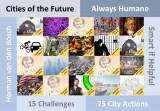
Recently, I published my new e-book: Cities of the Future. Always Humane. Smart if Helpful.
You can download this book for free here:
Dutch version
https://www.dropbox.com/s/ytdadwgdsdw6zke/Looking%20for%20the%20city%20of%20the%20future%20NL.pdf?dl=1
English version
https://www.dropbox.com/s/kfywoszhrn4xi5j/Looking%20for%20the%20city%20of%20the%20future.pdf?dl=1
In case you prefer a compact printed version in Dutch (180 pages), transfer €20,00 to IBAN NL35 INGB 000 167 55 50 on behalf of H. van den Bosch, mention your address and you will receive your copy in a few days
Looking for partners on Inclusive and AI
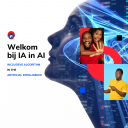
With Inclusive Algorithm, we would like to bring more inclusion and diversity in Artificial Intelligence revolution and business.
Our main objective is to generate more network and knowledge in the Artificial Intelligence field to better understand how artificial intelligence, algorithms and big data can be ethically developed for societal benefit by involving the marginalized groups (groups with migrant backgrounds & bi-culturals).
We just started this initiative and we are building alliances with people believing in our cause. Please feel welcome to reach out if you think we can add value to the work you do or vice versa.
Start inhaarlemmermeer.nl

Lokaal Community Platform voor bewoners, bedrijven en bezoekers van Haarlemmermeer. (Amsterdam Metropolitan Area)
Sinds 1995 zijn wij inwoners in de gemeente Haarlemmermeer. In de afgelopen 25 jaar is er veel veranderd binnen de gemeente. Soms als antwoord op, maar vaker vooruitlopend op de ontwikkelingen. De gemeente groeit. Mensen willen er wonen, werken en studeren, maar ook meer bedrijven vestigen zich hier in het hart van de economie.
Daarnaast vertegenwoordigen toeristen en evenementen in de regio elk jaar een aanzienlijk aantal bezoekers.
We denken na over het juiste evenwicht tussen leefbaarheid en welvaart.
- Over duurzaamheid en sociale verantwoordelijkheid.
- Over lusten verhogen en lasten verminderen.
- Over een integrale aanpak die zowel bewoners centraal zet, als bezoekers gastvrij ontvangt.
- Onze focus ligt op beter en niet op meer.
- Op kwaliteit en niet op kwantiteit.
We dragen actief bij aan een leefbare, aantrekkelijke en welvarende gemeente waar de economische ontwikkeling niet ten koste gaat van de leefbaarheid.
We werken intensief aan het verbeteren van de reputatie van Haarlemmermeer.
Wij willen met dit Community Platform bewoners verbinden zowel jong als oud. Ideeën transparant maken en een ieder hierbij betrekken. Elke leeftijdsgroep moet hiervoor in aanmerking kunnen komen. Door het initiëren van dit platform hopen wij bewoners een kans te geven door zijn/haar ideeën te ventileren en eventueel te implementeren, zodat wij allen als bewoners van Haarlemmermeer hiervan gebruik kunnen maken. Door het zichtbaar maken van de mogelijkheden en behoeften kunnen we de band als bewoners versterken en hierdoor een veilige, sfeervolle leefomgeving creëren.
Wij zijn dit community platform gestart vanuit onze eigen ideologie. Het geloof om een community te starten waar mensen elkaar kunnen helpen en bereiken. Waar wensen werkelijkheid kunnen worden als we gezamenlijk onze krachten bundelen. Laten we starten met de bewoner die bepaalt wat er noodzakelijk is en de gemeente kan informeren over de benodigdheden.
#Citizens&Living #DigitalCity
Research accelerates the sustainability of heating
AUAS contributes to accelerated roll-out of sustainable low-temperature heating networks in HeatNet project
The international research project HeatNet is all about making heat more sustainable. Less use of natural gas and more use of sustainable heat sources such as the residual heat from data centres. The project aimed to accelerate the roll-out of heating networks in urban areas. And that has been a success! Not only have new heating networks been developed in six European cities, the participating partners have gained knowledge about operating smartly in complex urban transitions. The professors and researcher involved from the Amsterdam University of Applied Sciences (AUAS) talk about the approach and the insights gained.
The role of the AUAS in the research project involves leading evaluations. During six evaluation meetings over three years, the partners reflected on their process of learning from each other and helping each other move forward. Professor of Energy and Innovation, Renée Heller: “As an evaluator, we not only wanted to determine how it went afterwards. But in accordance with the aim of this Interreg project – transnational learning – we embarked on a continuous learning process with each other.”
ON THE SHOULDERS OF GIANTS
This helps the pilot partners gain insights and build on each other’s discoveries. Frank Suurenbroek, professor of Spatial Urban Transformation: “In such complex transition projects, there is so much to consider. This process-based evaluation approach helps you gain insight into the issues you are facing. Such transitions are not a linear process and the insights cannot always be translated directly to other projects. But this approach does make complex processes navigable. It offers pathways for innovation that you can consider.”
The researchers translated this knowledge into various publications and guides, which have been made available to parties dealing with the roll-out of a heating network. Suurenbroek: “The Stakeholder Guide is also interesting for all parties that work on complex urban transitions.” Lecturer-researcher Egbert-Jan van Dijck was responsible for the development of the Stakeholder Guide.
“The heat transition requires an innovation at system level. Therefore, we carried out an extensive stakeholder analysis at meso-level,” explains Van Dijck. “It not only provides an impression of the individuals and organisations involved at the energy sector level, but also of their role in the chain, their interests and concerns. This step towards a situational analysis has enabled us to outline a holistic picture and carry out an in-depth analysis of barriers to the development of the new generation of heating and cooling networks in terms of finance, legislation and regulations and organisation.”
INVOLVING STUDENTS
“We are further expanding this analysis for education.” Van Dijck: Besides the human elements, we also analyse non-human elements, such as buildings, technologies, infrastructure, energy sources and subsurface. These are just as important in determining the situation as the human elements. For example, the pipes for a heating network cannot be laid through a river or a railway track. You need to be aware of these barriers.” Instead of just the people or the stakeholders, students see a much more complete situation at a glance. This goes for fourth-year students as well as second-year students.
Heller: “Several students have used this project for their graduation thesis. Students have even travelled to Ireland on their own initiative to learn more about the energy and heating situation there and to interview partners.”
ROLL-OUT OF HEATING NETWORKS
“There is a lot involved in creating a heating network,” says Heller. “Considering the complexity, it is unusual and significant that all six partners have succeeded in doing so in such a short space of time. It would be a shame not to use the valuable sources of heat available in a country. Data centres, for example, have a huge amount of heat left over. The roll-out of one heating network to multiple heating networks helps us to use available heat sources to increase sustainability and reduce our CO2 emissions.”
INTERDISCIPLINARY AND CROSS-THEMATIC
The HeatNet project is a good example of interdisciplinary collaboration between two research groups with different specialist knowledge. Frank Suurenbroek: “While the implementation of a heating network may appear to be a technical project, it is also an urban transformation process.” Heller adds: “Urban transition involves projects in which taking the energy leap seems the obvious choice, but where there is still little attention for the heat transition, while a great opportunity exists in that respect. Through our collaboration, we have seized that opportunity.”
Project Scale up - verslag marktconsultatie beschikbaar!!
Hartelijk dank voor je deelname aan de marktconsultatie Scale up | Bezoekersstromen in september/begin oktober 2020. Het infowebinar werd goed bezocht, en we hebben extra sessies moeten inplannen om de individuele gesprekken te kunnen houden. Veel verschillende organisaties met verschillende specialiteiten hebben interesse getoond, wat ons heeft geholpen bij het aanscherpen van de projectopzet. In de bijlage vind je een kort verslag van de thema’s die tijdens de marktconsultatie aan bod zijn gekomen.
Dankzij jullie input hebben we een aantal belangrijke inzichten op gedaan die ons helpen om het proces verder vorm te geven. Eén van de belangrijkste wijzigingen is dat we aan jullie vragen om je in te schrijven als keten (!)
Dit betekent dat je zelf samenwerkingspartners vindt waarmee je kan voldoen aan de drie competenties (data aggregeren, voorspellen, gedragsbeïnvloeding). Je kiest dus zelf je partners om aan de ketenoplossing te werken. De precieze voorwaarden en manieren waarop je dan samen inschrijft, vind je in de selectieleidraad die op 5 november 2020 online komt. We organiseren een aantal sessies waarin we toelichten hoe je samen inschrijft, en er komt een besloten LinkedIn-groep waarin je een oproep kunt plaatsen voor ketenpartners.
Wil je op de hoogte blijven?
Volg het project Scale up op LinkedIn: https://www.linkedin.com/in/-scale-up-oplossingen-opschalen/
Vervolgstappen
Op 5 november wordt de selectieleidraad gepubliceerd, op dat moment komt alle informatie online te staan om je in te schrijven. We gebruiken graag nog eenmalig je e-mailadres om je hiervan op de hoogte te stellen. Wil je dat niet, laat het dan even in een reactie op deze e-mail.
Personal User Interface for Office Climate

Hello all,
I am proudly sharing and same time invite you for visiting my exhibition at the Dutch Design Week #ddw20. My Final Master Project is selected as a part of Drivers of Change under the categories of sustainable future hosted by the Technical University of Eindhoven.
My project is a cross-faculty project at the Department of Industrial Design and Building Services Research Group at TU/e. I designed and programmed a smart user interface for a personal cooling system, which not only collects data in real-time for the development of machine learning models, but also creates an easy and intuitive way for users to achieve a comfortable thermal climate. This graduation project scored an 8 as a result.
Thanks to the industry and academia for their recognition and support of my graduation project, with special thanks and respect to my graduation mentor Professor Mr Loe Feijs.
The #ddw2020 shall be online and free of charge!
SEE YOU ALL THERE.
https://ddwtue.nl/projects/the-cooling-stat/
Urban and Smart City Professionals Invited to Join Online Smart City Course: Transferring the Amsterdam Approach to the Brazilian Context
Amsterdam Smart City (ASC) and Amsterdam University of Applied Science (AUSA) have teamed up with Insper to develop a course focused on transferring the Amsterdam smart city approach to the Brazilian context. The course is designed to introduce Brazilian urban and smart city professionals to collaborative innovation and governance topics. The course will enable participants to understand the possibilities of technical innovations for the benefit of a liveable city as well as the socio-economic preconditions that make these projects possible. Participants will better understand technological trends, discover opportunities for metropolitan improvements and learn how to organize and scale up smart city projects.
Course Overview:
· Dates & time: Nov 17, Nov 19, Nov 24, Nov 26, Dec 1, Dec 3 from 9:00-11:00 BRT / 13:00-15:00 CET
· Assignment: participants will work on an assignment that will apply the concepts from the course to a Brazilian case study
· Discount: organizations which enrol two employee will benefit from a 50% discount for the second registration
For more information and to apply visit: https://www.insper.edu.br/cursos-online/smart-city-transferring-the-amsterdam-approach-to-the-brazillian-context/
Amsterdam and Helsinki launch AI registers to detail city systems
The cities of Helsinki and Amsterdam have worked together to each launch a first-of-its-kind Artificial Intelligence Register.
“Together with the city of Helsinki, we are on a mission to create as much understanding about algorithms as possible and be transparent about the way we – as cities – use them,” commented Touria Meliani, Deputy Mayor of Amsterdam (Digital City).
Helsinki publishes guide to agile urban pilots
How to get the most out of urban experimentation? The guidebook for urban developers sums up learnings and experiences from agile piloting in Helsinki.
The Pocket Book for Agile Piloting shares the experiences from Smart Kalasatama and Jätkäsaari Mobility Lab in Helsinki and condenses the key learnings in a pragmatic and easily digestible way. Free download via Forum Virium
WeMakeThe.City RESET: Digital Rights

After two successful editions, the WeMakeThe.City festival is heading for 2025 as a biennale: the 750th anniversary of Amsterdam. This year the uncertain future of our city and metropolitan region was discussed in a 12-hour livecast marathon on the 21st of September. The WeMakeThe.City theme ‘Reset’ brings together genius thinking, imagination and creativity to formulate alternative perspectives for action. How are we going to do things differently in the coming years? How do we work together to make our metropolis fairer, more inclusive, more sustainable, more climate-resilient, safer, more successful and happier? After all, together we make the city of, for and by everyone!
During last spring's lockdown, it became even clearer how much we depend on the digital world. We meet, chat and date in front of the screen. A solution to combat the spread of Covid-19 is also being sought in the digital domain. These developments have raised the privacy issue again: how can people's data rights be protected? Such as anonymity, transparency and control over data. Time for a good conversation about values and the importance of digital civil rights.
The session kicks off with Marleen Stikker, director of Waag and Ger Baron, Chief Technology Officer of the City of Amsterdam. Marleen explains what our digital human rights are. ‘These are the same rights just as in the analogue world. Where there is relatively much attention for analogue human rights, our civil rights in the digital domain have run wild, too little attention has been paid to this. Let's reclaim those rights! It is for example about the right to be forgotten, the right to be anonymous, but most important to me is digital sovereignty. Everyone should have the possibility to have insights in their own actions online.’
Ger agrees with Marleen. According to him, governments, and cities as well, collects too many data about residents and the public space without even knowing what they want to do with these data.’ The reason to collect them should be to learn something specific that you can improve or help people. Helping people with the collection of data also brings in new dilemmas. The city used to have a collaboration with energy providers for example. Once someone didn’t pay for the energy service, they sent out a message to the city administration. The City could then prevent someone get evicted from his/her home.
This example is not enough reason for Marleen to collect the data: ‘To me, this sounds as if we didn’t invest in our society. We could have helped these people as well if they had adequate supervision or guidance. In last years, we invested heavily in the digital domain and we made budget cuts on home care, debt counselling and community police officers. Digital solutions are not always the best solutions! Especially not when all kinds of companies have data without people knowing about this.’ Ger: ‘To a certain point I agree with this point. Digital rights also include rights to know about the data that is collected, why this is and what you can do about this. This is currenty not transparant at all, even though the City of Amsterdam is becoming more and more about about his.
Marleen: ‘I see the City of Amsterdam going in the right direction, by starting for example the Coalition for Digital Rights. However, the steps in this direction go really slow, especially in politics. This way, it remains unclear what rules companies dealing with personal data should obey. That’s why Marleen also calls on politicians in The Hague: guarantee digital human rights by imposing conditions on the market.’
Next up is Miram Rasch, researcher and teacher at the Amsterdam University of Applied Sciences and writer of the book ‘Friction. Ethics in times of dataism. Her book opens with a story about escaping the eyes of data collectors and algorithms. She states this is only possible at home. And even there, it becomes harder. ‘We have smart meters, smartphones, smart tvs. It is not clear why these devices need to collect data, with whom they share them. We don’t know now, but especially we don’t know in the future. Everybody has something to hide, because we don’t know yet what we should hide. Of course you have to inform yourself about the conditions you’re accepting. However, this is not easy at all. Try to read the Terms and Conditions of the services you use, the texts are too long and complicated. Unfortunately it can take a long before something changes. The few individuals who are conscious about the digital world, won’t change it. We need rules and regulations! But we know from the past, that maybe something heavy has to happen before people open their eyes.’
Jim Boevink, advisor Taskforce Digital Safety at the City of Amsterdam, starts an intermezzo about the right to be anonymous. Marleen Stikker: ‘People who want to abuse others, are free to hide themselves. This is because platforms are not responsible for the content their users post. They earn money with these users, they are their business models. But they they are not responsible for things happening on their platform. This is the first thing that has to change. The legal system is not in order. Make them responsible for the content on their platforms.’ M****arleen: ‘And good to emphasize: someone who is critical about the digital domain and the internet, is not necessarily against the digital world. We only have to make the internet safe and reliable!’
Want to watch the livecast (in Dutch) yourself? Check <https://dezwijger.nl/programma/reset-digital-rights>.
ModelMe3D - City Information Modeling !!!DEMO!!!

Howdy - this Friday 25.09 @12h we'll be giving a demo to show you MM3D - a new “white board” for city information modeling that can empower you or any other project stakeholders to plan, collaborate & share projects. In this webinar we’ll show you what all these features and functionalities mean for your own real-world projects. We’ll be using the Marineterrein (former navy base) in the heart of Amsterdam as our user case. Interested? Grab a sandwich and sign up here: bit.ly/MM3D_MT
High-tech solutions to the circular economy and digital citizenship
How can Distributed Ledger Technologies (DLT) and Blockchain contribute to a more transparent, sustainable and inclusive future?
As we launch the DLT4EU programme, we are having a panel discussion on the potential role and pitfalls of DLT in Europe. In the panel Indy Johar from Dark Matter Labs will join Piret Tõnurist, Innovation Lead at OECD - OCDE, and Ludovic Courcelas, Government Strategy Lead at ConsenSys. Together they will discuss how DLT and blockchain can encourage a more circular and democratic society.
Join us for this public online event on September 17th from 6pm CET.
More info on the DLT4EU programme: https://www.metabolic.nl/projects/dlt4eu/
Stay up to date
Get notified about new updates, opportunities or events that match your interests.

